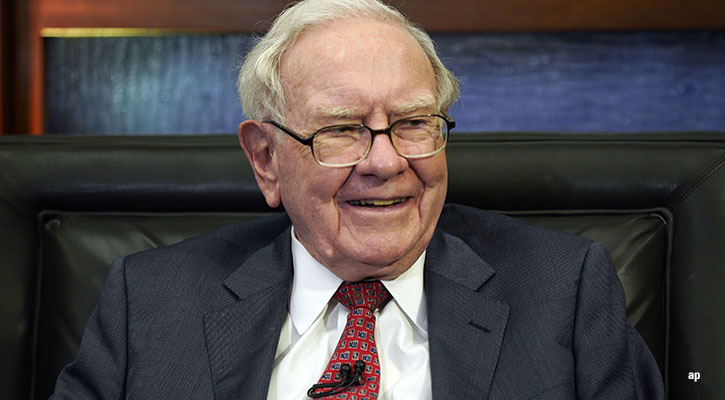
In an era when index funds have overtaken actively managed vehicles, Berkshire Hathaway (BRK.A/BRK.B) chairman and CEO Warren Buffett is holding on to his legacy as perhaps the greatest investor of all time. He has often written about one core principle: he wants to buy pieces of companies, not stocks.
But what makes a great company? If you ask Buffett, it includes:
• An economic moat
• An outstanding management team
• Thoughtful capital allocation
• Actual earnings power and financial strength
• An easy-to-understand business
Here, I’ll dig into some of the key traits Buffett has focused on since he started his investment career nearly seven decades ago.
Trait 1: An Economic Moat
Above all else, Buffett looks for companies with a durable competitive advantage, or economic moat. Just as a circle of water or dry land protects a castle from intrusion, an economic moat protects a company from being encroached on by competitors. In his extensive letters to shareholders over the years, Buffett has discussed several key moat sources, including a low cost of production, economies of scale, unique products that competitors can’t replicate, exceptional distribution systems, and a strong brand identity.
Examples from Berkshire Hathaway’s investments:
• Geico
A Berkshire subsidiary that has enjoyed a durable cost advantage by selling policies directly instead of paying sales reps.
• Coca-Cola (KO)
It has profited from a strong brand, an extensive distribution network, and millions of customers who won’t switch to another beverage.
• Apple (AAPL)
It boasts a carefully maintained ecosystem, favourable demographic trends, and indispensable products.
Trait 2: An Outstanding Management Team
Buffett also seeks out companies with outstanding CEOs. Some of the qualities he looks for are integrity, financial discipline, dedication to quality, maintaining a tight focus on their circle of competence, and thinking independently instead of falling victim to the “institutional imperative,” which involves resistance to change, making misguided acquisitions, catering to the business leader’s whims, and mindlessly imitating the strategy of other companies in their peer group.
Examples from Berkshire Hathaway’s investments:
• Katherine Graham and Dick Simmons from the Washington Post Company, now Graham Holdings (GHC)
Buffett praised the late duo for their managerial skills, integrity, and dedication to treating shareholders well.
• Capital Cities/ABC’s late executives Tom Murphy and Dan Burke
Buffett called them the “best managerial duo” that he had ever seen thanks to their ability, integrity, and skill at both operations and acquisitions.
• Coca-Cola’s late chairman and COO Donald Keogh
Buffett praised him for his business talent and ability to bring out the best in people around him.
Trait 3: Thoughtful Capital Allocation
This trait is closely related to the previous one. Buffett looks for companies with boards and management teams that consistently deploy their capital to build shareholder value over time. He avoids companies with executives who are prone to distractions, empire-building, frittering away money on acquisitions, and diluting shareholder value by issuing shares.
This line of thinking has heavily influenced how Berkshire Hathaway itself is managed. Buffett wrote somewhat sheepishly about the company’s 1986 purchase of a corporate jet (nicknamed The Indefensible) but ultimately came to appreciate that it made travel significantly more comfortable and efficient. He has also frequently written about Berkshire’s streamlined corporate staff and the value of share repurchases, which are a tax-efficient way to give each shareholder a larger stake in the company.
Examples from Berkshire Hathaway’s investments:
• Coca-Cola
The company has bought back 3.6 billion shares of common stock (as of Dec. 31, 2023) at an average price of US$17.96 since it first introduced its share repurchase program in 1984.
• The Washington Post Company
Buffett praised it for making share repurchases at low prices.
• Capital Cities/ABC (now part of Walt Disney (DIS))
Buffett admired it for its thoughtful and effective acquisition strategy.
• Apple
The company has repurchased roughly US$600 billion worth of its own shares over the past 10 years.
Trait 4: Actual Earnings Power and Financial Strength
Buffett has often written about the limitations of audited financial statements. One particularly good Warren Buffet quote: “It’s simply to say that managers and investors alike must understand that accounting numbers are the beginning, not the end, of business valuation.”
He made a sharper critique in his 2023 letter to shareholders, deriding reported net income figures as “worse than useless”.
There are two main reasons for his scepticism about publicly reported financial results. First, they provide only a snapshot (either annual or quarterly) of a company’s results. Second, accounting earnings can frequently be distorted by unrealised capital gains and losses, mergers and acquisitions, tax quirks, and other issues.
To avoid these problems, Buffett instead focuses on companies with underlying earnings power and financial strength. His preferred measure is operating earnings, which strips out items such as noncash inventory costs, depreciation, goodwill amortisation, and deferred taxes. He also uses other metrics such as return on equity capital and free cash flow.
Examples from Berkshire Hathaway’s investments:
• The Washington Post Company
It has benefited from a subscription business model and low debt.
• Geico
Has a rock-bottom cost structure and enjoys the benefits of float, which is the money an insurance company receives upfront and can invest until claims are paid out.
• Burlington Northern Santa Fe
It requires heavy capital investments but provides a fundamental service that’s essential to people and businesses around the country.
• See’s Candies
It has a low cost structure and millions of repeat customers for its boxed chocolates.
• MidAmerican Energy
An electric utility that operates in Iowa, Illinois, Nebraska, and South Dakota. While the utilities business is heavily regulated and capital-intensive, it can generate attractive profits over time.
Trait 5: An Easy-to-Understand Business
This trait is a close cousin to the previous one. Buffett values simple, easy-to-understand business models and shuns complexity. For this reason, he avoided technology stocks for many years (although he eventually bought shares in IBM in 2011 and Apple starting in 2016). He has also generally shunned other rapidly evolving industries, such as airlines, paper, and investment banking.
Examples from Berkshire Hathaway’s investments:
• Gillette, now part of Procter & Gamble (PG)
A business that Buffett described as “very much the kind we like”. It has a standardised product that needs to be replaced often, leading to brand loyalty and repeat purchases.
• See’s Candies
It has a similarly uncomplicated business of making candy (mainly chocolate) and selling it.
• Nebraska Furniture Mart
It was founded by Rose Blumkin, a Russian immigrant, in 1937. Blumkin (officially known as Mrs. B) described her company’s business model as “sell cheap and tell the truth”.
Simple, But Not Easy
The five traits I described above aren’t rocket science, but they may be deceptively straightforward. Buffett himself has described investing as “simple, but not easy.” It’s highly unlikely that any individual—or professional—investor would be able to replicate Berkshire Hathaway’s record by applying these precepts. Indeed, Buffett has advocated broadly diversified index funds with low fees as the best choice for most investors. For those willing to take on the risk of individual stocks, though, focusing on the five qualities above is an excellent starting point.





:quality(80)/cloudfront-us-east-1.images.arcpublishing.com/morningstar/2RGHQJTF4ZEURNSAGBY7CSHCUQ.jpg)
:quality(80)/cloudfront-us-east-1.images.arcpublishing.com/morningstar/LBDI6DN3WVCCZAOR6QRL6PGTGM.jpg)
:quality(80)/cloudfront-us-east-1.images.arcpublishing.com/morningstar/E2O6FYSNSITQA6AVAVGH5JSZ4I.png)













